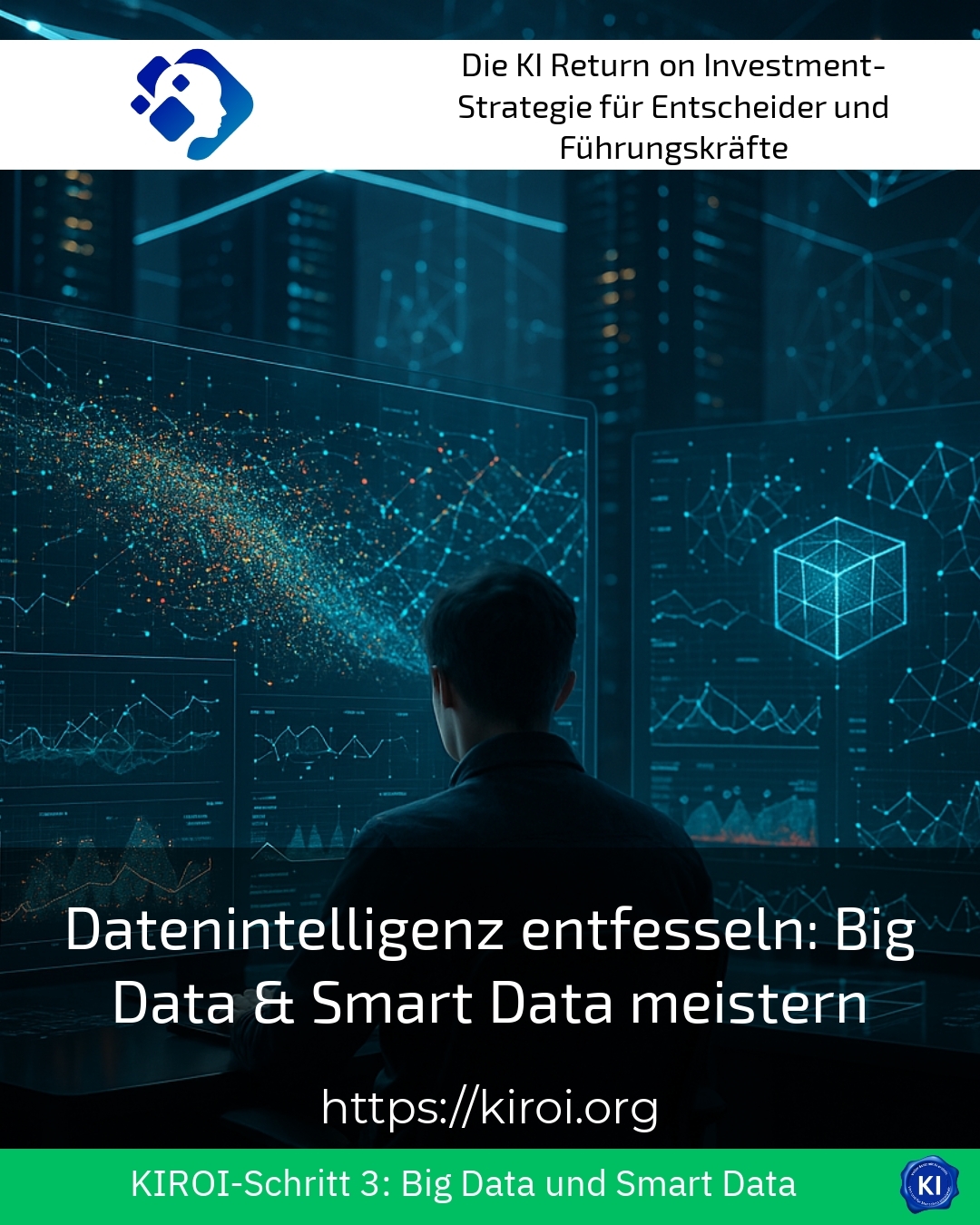In today's digital world Data intelligence is a decisive factor in creating real added value from huge amounts of data. Companies are faced with the challenge of not only managing large volumes of data - known as big data - but above all generating intelligent, high-quality data - i.e. smart data. The ability to understand big data and transform it into actionable information supports targeted decisions and provides competitive advantages.
Data intelligence as a bridge between the flood of data and business success
Big data describes the sheer volume of heterogeneous and often unstructured data that is generated daily from various sources such as sensors, customer interactions or social media. For example, a modern production plant continuously generates sensor data, social media platforms constantly deliver new contributions and financial companies record transaction information at high speed. Nevertheless, big data initially remains a raw material that can hardly be utilised without targeted processing. This is where Data intelligence It transforms this raw data into high-quality, context-related information.
An example from the manufacturing industry shows how data intelligence is utilised: Sensor data from machines is analysed using algorithms in order to plan maintenance cycles. This can significantly reduce downtimes and cut costs. In marketing, this intelligence helps to address target groups precisely and organise campaigns more effectively. Financial institutions also benefit by using intelligent data analyses to detect and prevent attempted fraud at an early stage.
Data intelligence and the transition from big data to smart data
While big data is primarily characterised by volume, speed and variety, smart data focuses on the quality and usability of the data. Smart data is created through intelligent filtering, cleansing and contextualisation of big data in order to provide immediate and precise insights.
For example, companies in the retail sector analyse large amounts of customer and sales data in order to identify purchasing patterns and optimise stock levels. A clear differentiation from pure big data makes it possible to utilise this information quickly and in a targeted manner. This enables e-commerce platforms to offer personalised product recommendations, increase customer satisfaction and boost sales.
Another application example can be found in the area of supply chains: By analysing inventory and transport data, companies are able to shorten delivery times and predict bottlenecks. Linking real-time data with historical patterns leads to more efficient processes and cost savings.
BEST PRACTICE with one customer (name hidden due to NDA contract)
The use of data-intelligent solutions has optimised maintenance cycles at an automotive supplier. The precise analysis of machine data made it possible to detect faults at an early stage and reduce spontaneous failures by 30 %. This led to a significant increase in production efficiency and lower costs.
Recommendations for action to increase data intelligence in companies
In order to strategically unleash data intelligence, companies should systematically pursue the following steps:
- Improve data quality: Raw data must be cleansed, consolidated and checked for relevance in order to enable reliable analyses.
- Use technological tools: Modern AI algorithms, machine learning and data mining help to recognise patterns in large quantities and generate smart data.
- Train employees: Expertise in handling and interpreting data is crucial for making data-intelligent decisions.
- Identify industry-specific use cases: Not every data source is relevant - target group and market analyses must be tailored to the company.
The relevance is also evident in the healthcare sector: hospitals analyse patient data in order to optimise treatment processes and use resources efficiently. This not only improves medical care, but also reduces costs.
BEST PRACTICE with one customer (name hidden due to NDA contract)
In e-commerce, a personalised marketing strategy was developed through data-intelligent analysis of purchasing habits. This resulted in an increase in customer loyalty and an increase in sales of 15 %. The targeted use of smart data was the key to success.
Data intelligence to accompany complex change processes
Many companies seek support when launching data intelligence projects. A guided approach - such as transformation coaching - helps to clarify relevant issues, set priorities and work in a goal-oriented manner.
Data intelligence projects are widespread in the automotive industry: Manufacturers use intelligent analyses to optimise the sales process, improve production processes and pursue sustainability goals. These complex projects can be implemented in a structured and efficient manner with the help of external consultants.
Data-intelligent systems also support risk analysis and portfolio management in the financial services sector. Precise and quality-assured data are among the most important resources here.
In retail, data-intelligent solutions help to identify customer trends and reduce return rates in a targeted manner. The impetus gained from this can sustainably improve marketing and sales strategies.
My analysis
Data intelligence is the key to generating valuable smart data from the huge volumes of big data. It enables companies to optimise processes, understand customers better and secure competitive advantages. The active use of modern technologies and targeted support in projects significantly increase the chances of success. Companies that systematically utilise data intelligence create a solid foundation for well-founded decisions and sustainable growth.
Further links from the text above:
Smart data definition and benefits
Difference between big data and smart data
Data intelligence in the context of big & smart data
For more information and if you have any questions, please contact Contact us or read more blog posts on the topic Artificial intelligence here.















